Filters can be applied to refine the search. Provided filters are:
- Normal/Abnormal Results
- Received Date (Today, Last 7/30/365 days, and Date Range)
- Ordered Date (Today, Last 7/30/365 days, and Date Range)
- Assigned To
- Retain filters
In order to view the Beta Lab module, users can select the ‘Beta’ option under the ‘Lab Result view’. (Personal > Preferences > General)
Click here to see how.
The user navigates to ‘Results’ in the ‘Clinical’ via ‘Orders & Results’. This opens the Lab Result tile, where the result listing is displayed in the left pane and the selected lab result is shown in the right pane.
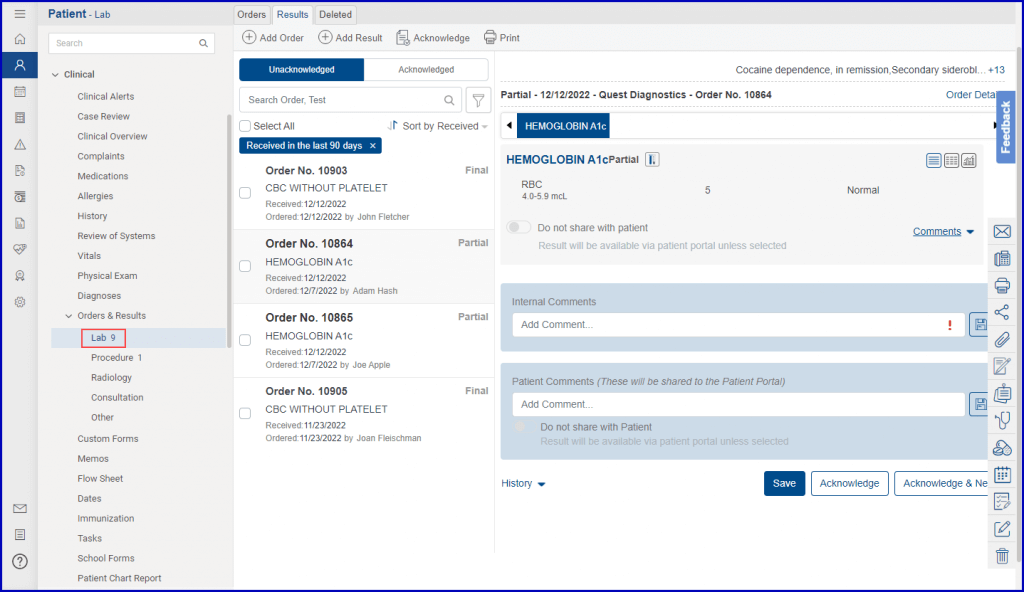
Users can use the Search feature to find lab results by the patient order number or test name. Search results are segregated by:
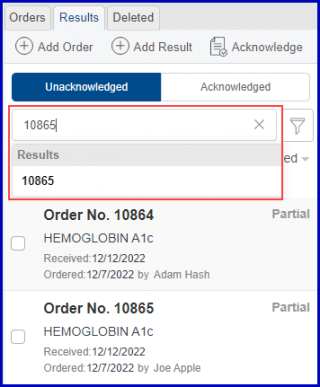
Filters can be applied to refine the search. Provided filters are:
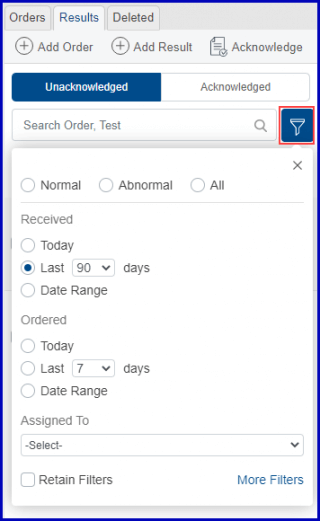
Filter tags are created for all the filters applied by users. These can be removed easily by either crossing them out or updating them from the filters menu.
The ‘Received in the last 90 days’ filter is applied by default when the user navigates to lab results.
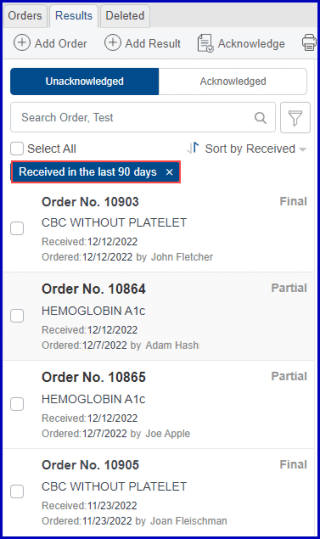
The default filter can be temporarily removed by clicking the cross icon on the filter tag.
If the user applies a different filter and retains it by marking the ‘Retain Filters’ checkbox, the newly applied filter becomes the default.
Results can be sorted by:
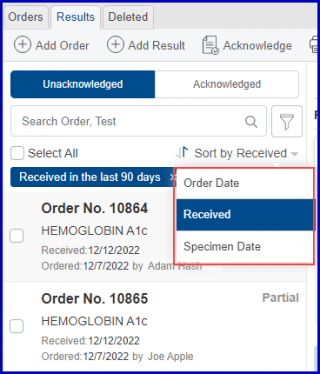
Sorting can be changed to ascending or descending using the ‘![]() ’ icon.
’ icon.
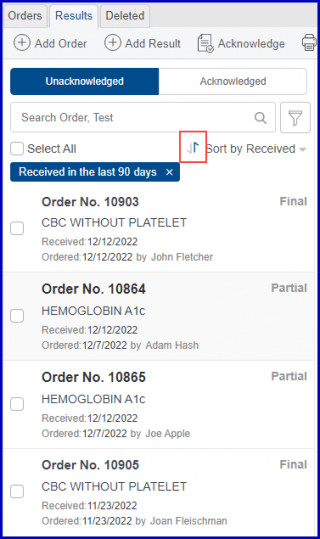
Badges appear next to each result to indicate if they are critical/advisory, acknowledged, have additional attachments or comments, assigned to a user and shared to patient portal. The details of the badges are displayed below:
Critical results are marked by red indicators whereas advisory results are shown with yellow indicators.
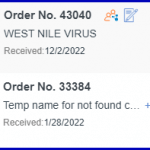
Select a lab result to view its details in the right pane.
Order details such as the order number, ordered date, ordering provider, and accession number are also displayed in this section.
The status of the result, received date, and laboratory name are also displayed here.
The navigation bar provides centralized control to go through all tests in the result. Users can click on the ‘![]() ’ icon to view all the tests and jump to the desired test.
’ icon to view all the tests and jump to the desired test.
A count of abnormal observations is displayed on top of the test name in the navigation bar.
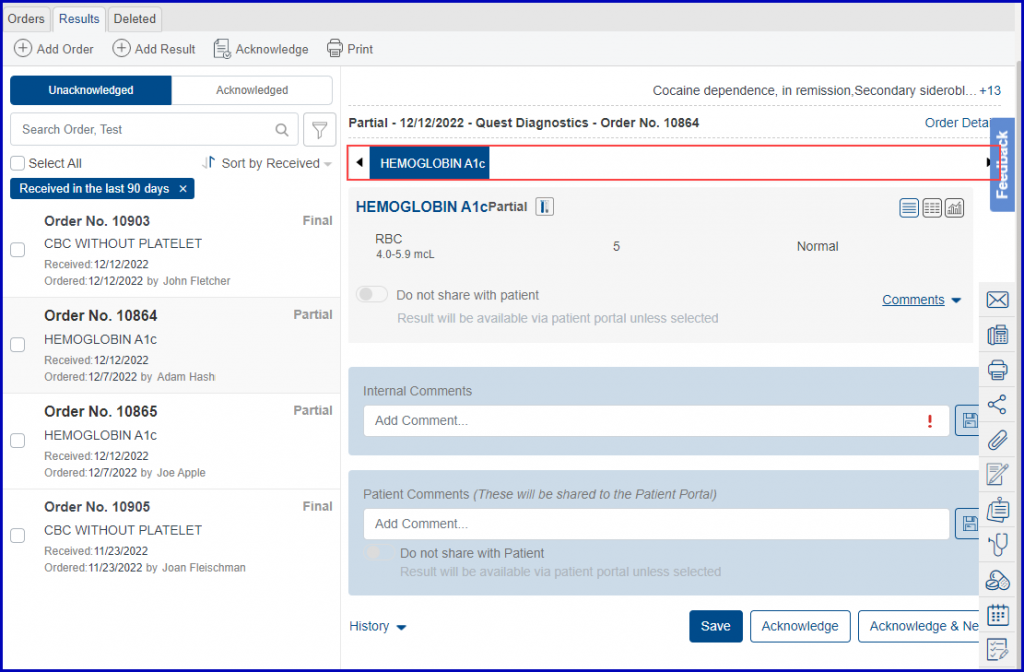
Users can view the result in the following views:
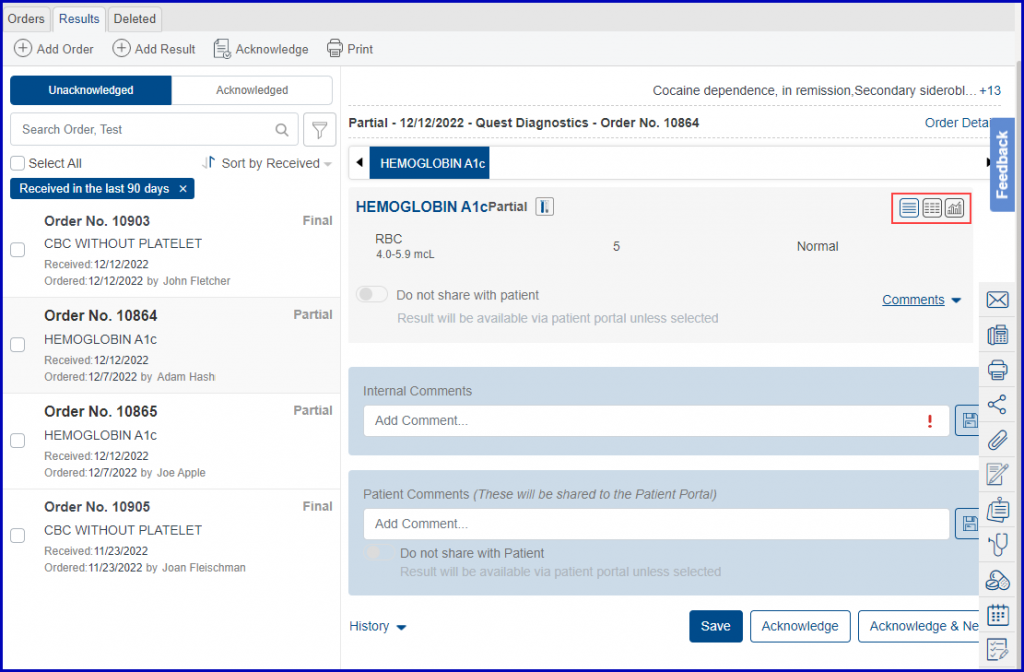
In the graph view, graph is displayed for the selected observation only. Multiple observations cannot be selected at the same time.
To view graph view of the lab result, click the graph view icon.
Date range for the graph can be selected using the ‘Reset’ and ‘To’ text boxes.

Users can zoom in and out of the graph using the ‘ + ‘ and ‘ – ‘ icons respectively.
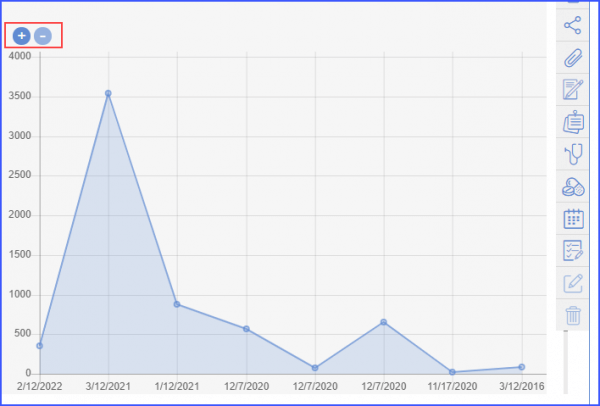
The date ranges on the x-axis of the graph can be displayed in chronological or reverse chronological order. Click here to see how.
Users can view the specimen details related to each test as well. The details include specimen name, received date, ordered date, and ordered by.

An icon to view test instructions has been added in lab results in the beta view.
This allows users to view test instructions sent to the lab with the order.
When the user opens a specific lab result that has test instructions associated with it, the system displays a ‘Test Instructions’ icon next to ‘Specimen’ icon.
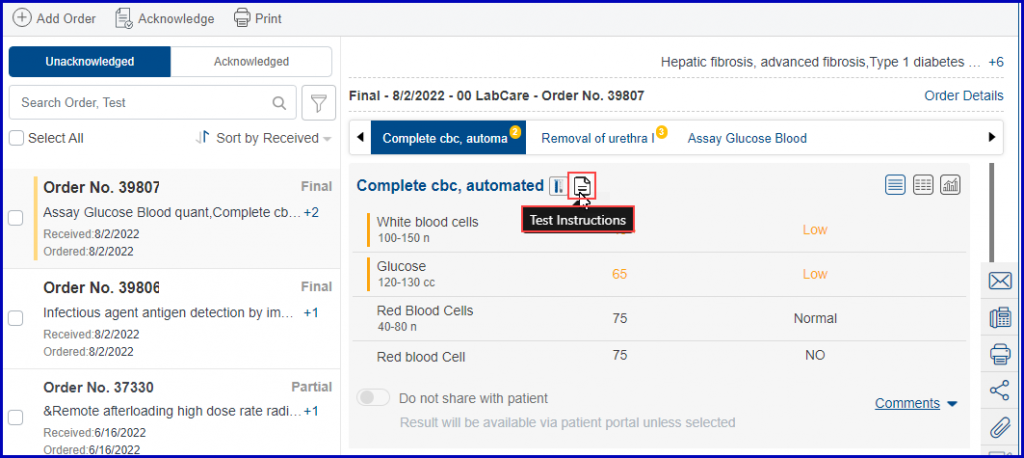
Clicking on this icon opens the test instructions associated with the lab order.
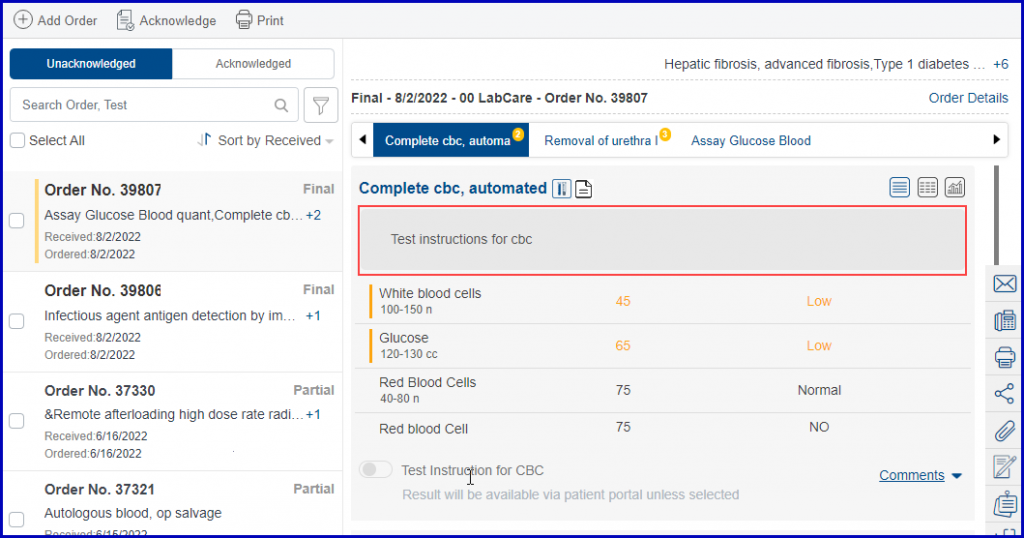
A similar enhancement has been made in the ‘Personal’ Module. Click here to view the change.
Users can use the floating menu to perform various actions.

On hovering on the floating menu, the following icon details are displayed:
Users can add internal and patient comments on every test. The internal comments can be marked as important using the ‘![]() ’ icon. Comments that are marked important are pinned to the top.
’ icon. Comments that are marked important are pinned to the top.
Sharing for lab results has been made customizable. Sharing of tests can now be managed via toggle button provided. User can choose to share specific tests with patients.

Patient and internal comments are shown on the provider note SOAP text based on user preferences.
Internal and patient comments are automatically saved for a result in Beta Labs Module.
This ensures that comments are automatically saved even if the user leaves the window.
If the user adds ‘Internal Comments’ and ‘Patient Comments’ and navigates to perform an action on ‘Diagnosis’ or ‘Appointment’ in the floating menu without clicking on the ‘Save’ buttons next to Internal Comments and Patient Comment, the comments are still saved.

Similarly, the added Internal Comments and Patient Comment are auto saved if user clicks on the ‘Acknowledge’ or ‘Next’ button without clicking on the ‘Save’ button next to Internal Comments and Patient Comment.

However, if the user adds an Internal Comment or a Patient Comment and tries to navigates to the any other action including ‘Add Order’, ‘Add Result’ , ‘Acknowledge’ or ‘Print’, the system displays a prompt alert stating: ‘The comments added are not saved. Do you still want to proceed?‘

Clicking on the ‘Yes’ button deletes the comments and takes the user to the desired page.
However, clicking on the ‘No’ button allows the user to return to the previous page where comments can be saved.
Click here to view a similar enhancement in the ‘Provider Note’ in the ‘Patient’ module.
Action buttons are provided at the bottom of the result.
Logs are maintained for all actions performed.

Attachments can be added or deleted from the lab results in beta view.
This provides user the option to remove an incorrect attachment.
In the ‘Results’ tab, click ‘Attachments’ from the floating menu.
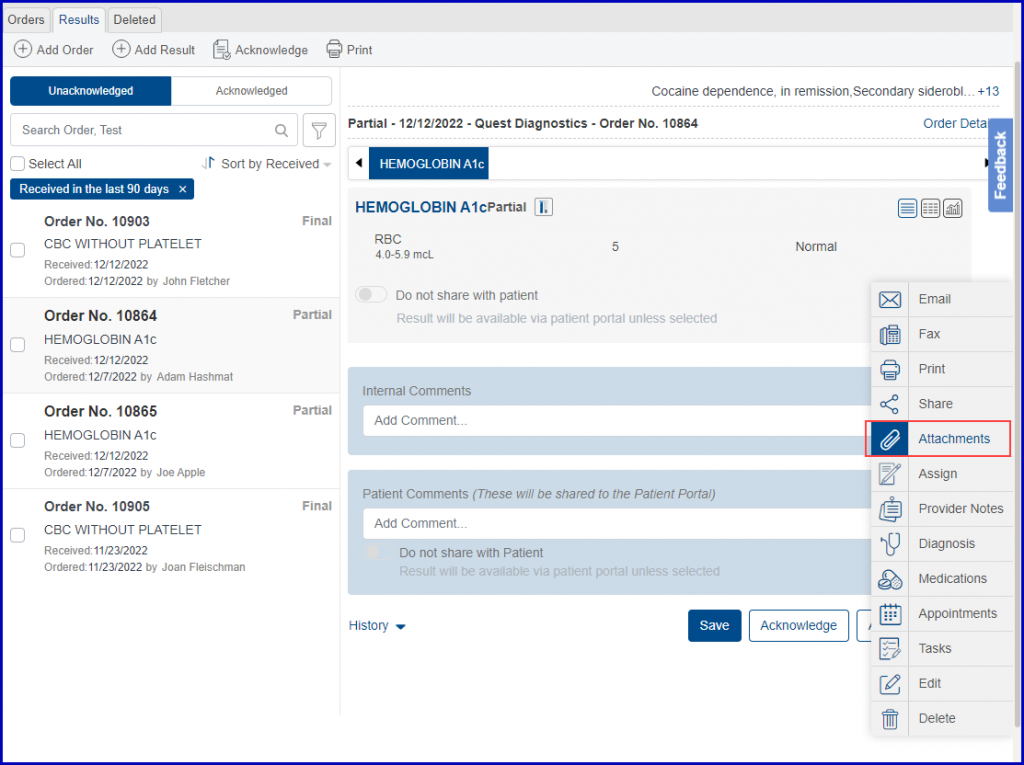
System displays an ‘Attachment’ window which has:

User can view a file by clicking on its hyperlink. In case the file is in unsupported format, it gets downloaded. A file can also be downloaded by clicking the ‘![]() ’ icon.
’ icon.
To remove a file from the attachments, click on the ‘![]() ’ icon. ‘Delete Attachment’ window appears where the user can add a Reason/Comments. Click ‘Yes’ and the file is removed.
’ icon. ‘Delete Attachment’ window appears where the user can add a Reason/Comments. Click ‘Yes’ and the file is removed.
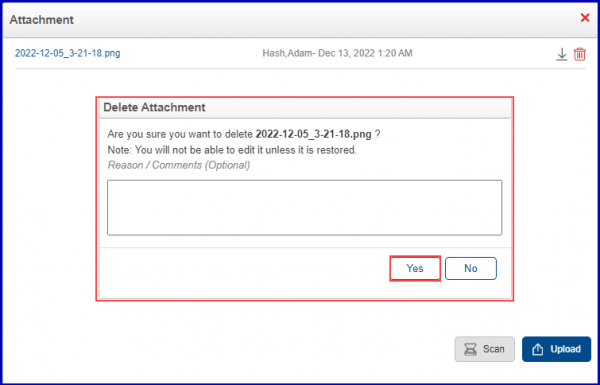
To restore a deleted file, user can navigate to ‘History’ and click ‘Restore’ hyperlink next to the file.
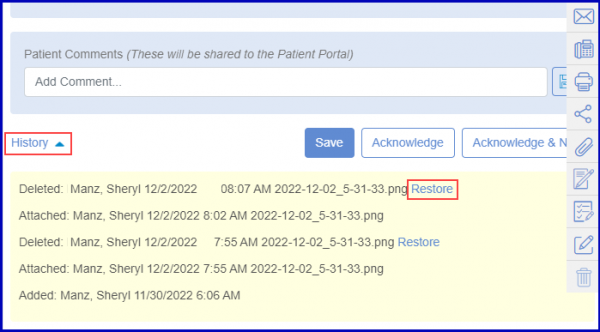
‘Restore Attachment’ window appears where the user should click ‘Yes’ and the file is moved back to the attachments.
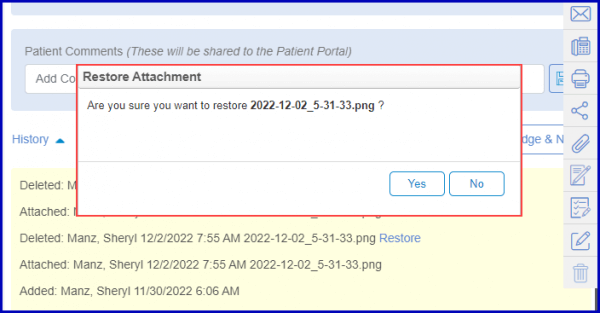
A file can be added to the attachments by clicking the ‘Upload’ button.
If the user permission ‘Edit Lab Result’ is disabled in the ‘Settings’ module, the user can only download a file. ‘Scan’, ‘Upload’, and ‘Delete’ buttons disappear from the ‘Attachment’ window.
In order to enable ‘Edit Lab Result’ click here.
Users can select multiple lab results simultaneously in beta lab view.
This reduces the manual effort involved in selecting and acknowledging each lab result separately.
On the lab results screen, the system displays a master checkbox under ‘Sort by’ filter allowing. Enable the master checkbox to select all lab results at once.
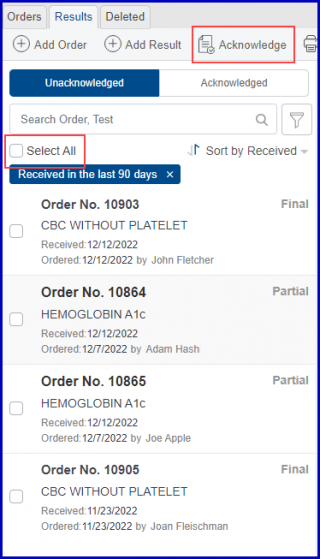
Click the ‘Acknowledge’ button to acknowledge all selected lab results.
Users can print multiple lab results simultaneously.
To print the lab results, mark the checkboxes for the desired lab results. Then click ‘Print’.

System prints multiple lab results.
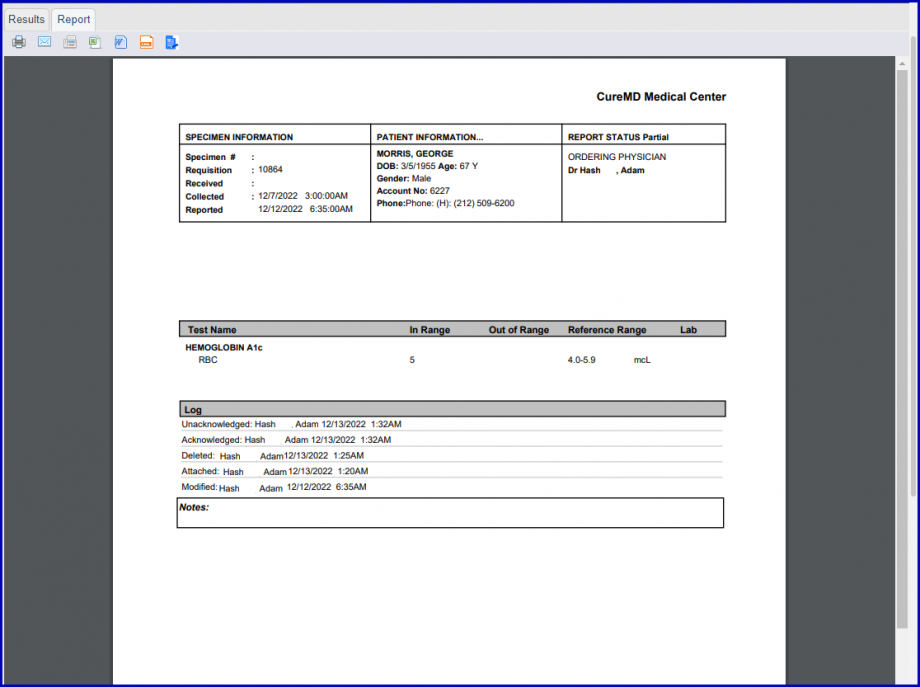
Users can only print multiple lab results which have the same requisition template configured. Click here, to view how to configure requisition template.
If the user attempts to print multiple lab results which have different requisition templates configure, the system displays an error message.

Acknowledged and unacknowledged lab results can be easily viewed in separate tabs.
By default, the system displays unacknowledged lab results.
Click the ‘Acknowledged’ tab to view the acknowledged lab results. Acknowledged badge is not displayed next to the accepted lab results.
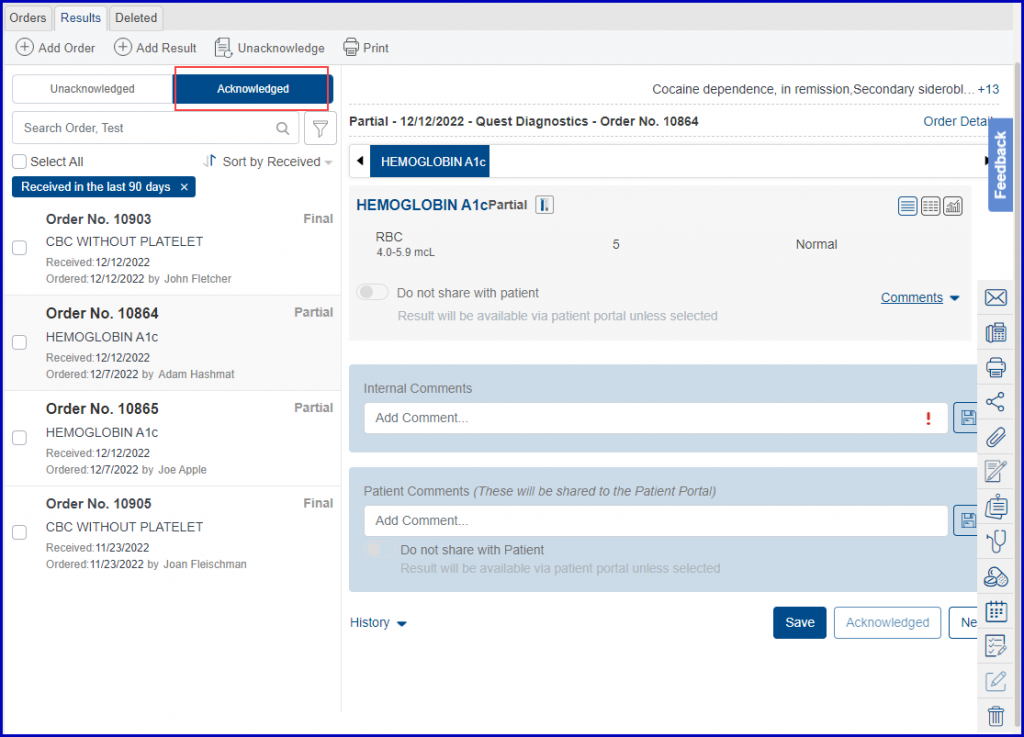
Patient comments can be printed on lab results with report template ‘LabCorp’, ‘LabCorp_LocID’, ‘SunRise’, ‘Quest’ or ‘BioReference’.
This helps users in viewing the complete information on the printed report.
To see how to select a lab report template, click here.
The users should also have enabled preference for adding patient comments on the lab report. To enable this preference, click here.
Select a lab result with patient comments added to it. Then click ‘Print’.
The system displays the patient comments on the printed lab result report.

Smart phrases have been incorporated in the lab results beta view.
This allows providers to efficiently write notes/comments by using pre-defined phrases.
To view smart phrases, type (.A) in the ‘Internal Comments’ or ‘Patient Comments’ section and press Ctrl + Space.
The system displays a dropdown with top 5 results stored in alphabetical order.
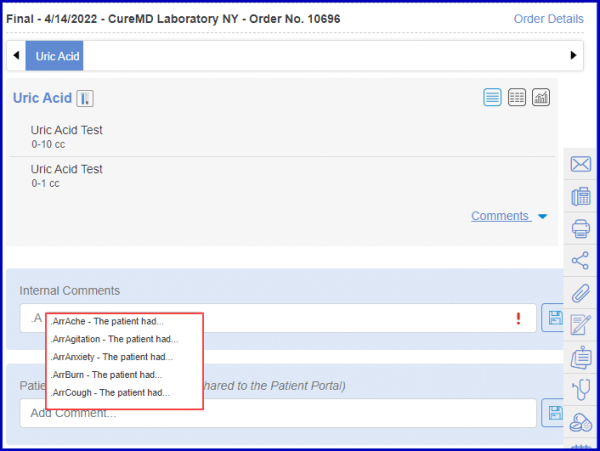
The beta view of lab results is enabled by default for all newly created users.
Users can experience the enhanced interface of lab results from the beginning.
Users can disable the Beta View from the patient’s general preferences.
Disabling the Beta View would keep the old layout for the lab result page.
Click Here to learn how to disable the Beta View.
The laboratory address is displayed on the result report instead of the practice address.
This ensures related lab address information is displayed along with the lab name.
Once the lab result is printed, the laboratory address is displayed under the lab’s name.
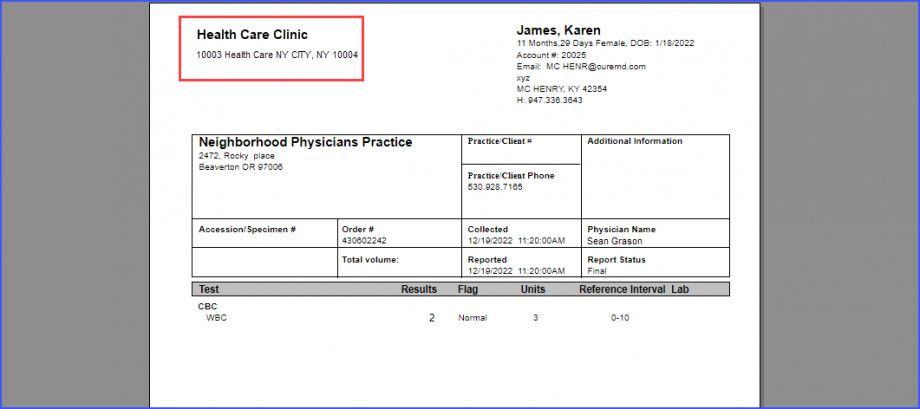
Test results with similar LOINC codes are mapped and displayed in a tooltip on flowsheet.
On the flowsheet, an information icon is displayed next to the test name.
When the user hovers over the test name, the system displays a tooltip containing a table stating:
‘Similar LOINIC Codes exist for other Test Descriptions for other Laboratories’
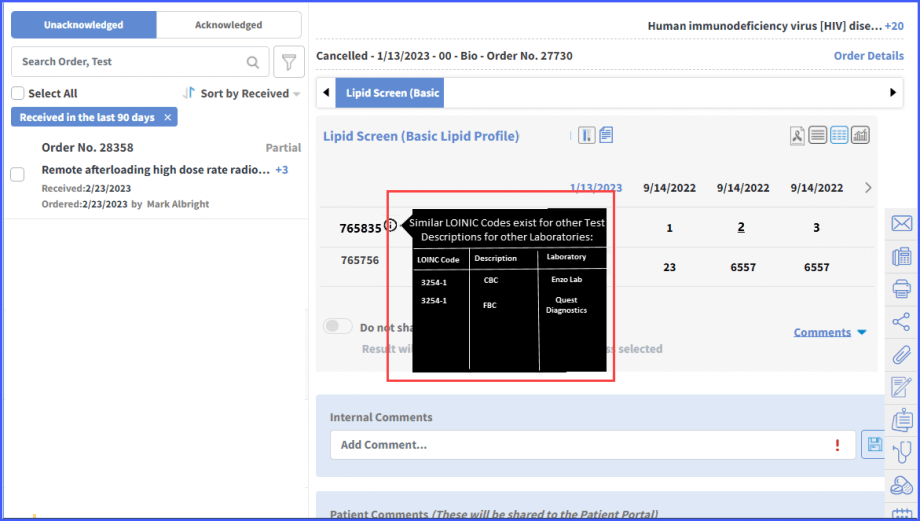
Users are able to view the additional performing facilities addresses on the result report.
If the user has received a result where more than one facility is performed laboratory action, then all the performing facilities are displayed in the footer of the result report.

Click here, to view how to enable settings for the display of performing facilities address on result report.
To view the additional performing facilities addresses on the result report, click on the ‘Report Template’ dropdown under ‘Results’ and select the ‘Standard- Secondary Address’ option.
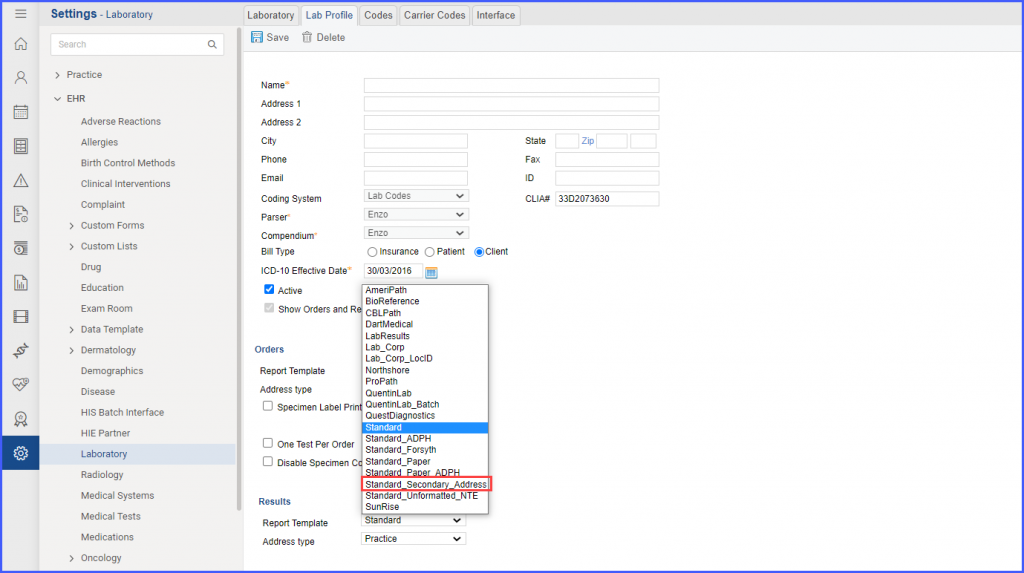
Then, click ‘Save’.
Click here to view the impact of this change on the result report.
The user can print the patient’s mobile number on the Result Report. When the user clicks on the checkbox against the Order No. and then clicks the “Print” button, the Result Report displays the patient’s “Mobile Number” in the patient information section. The mobile number data is fetched from the patient’s profile under the Demographics section.
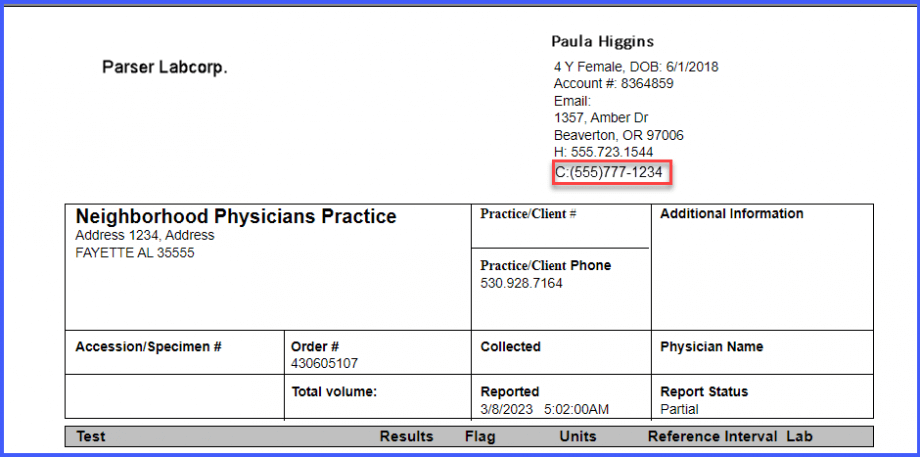
The user is able to distinguish the active providers from the inactive providers in the “Assigned To” and “Ordering Provider” filter dropdowns under lab results section.
When the user navigates to the lab results and clicks on the filter icon, selecting the “Assigned To” dropdown presents a list of providers.
Active providers appear at the top of this list and are displayed in black, allowing for easy identification. In contrast, inactive providers are listed at the bottom in gray color.
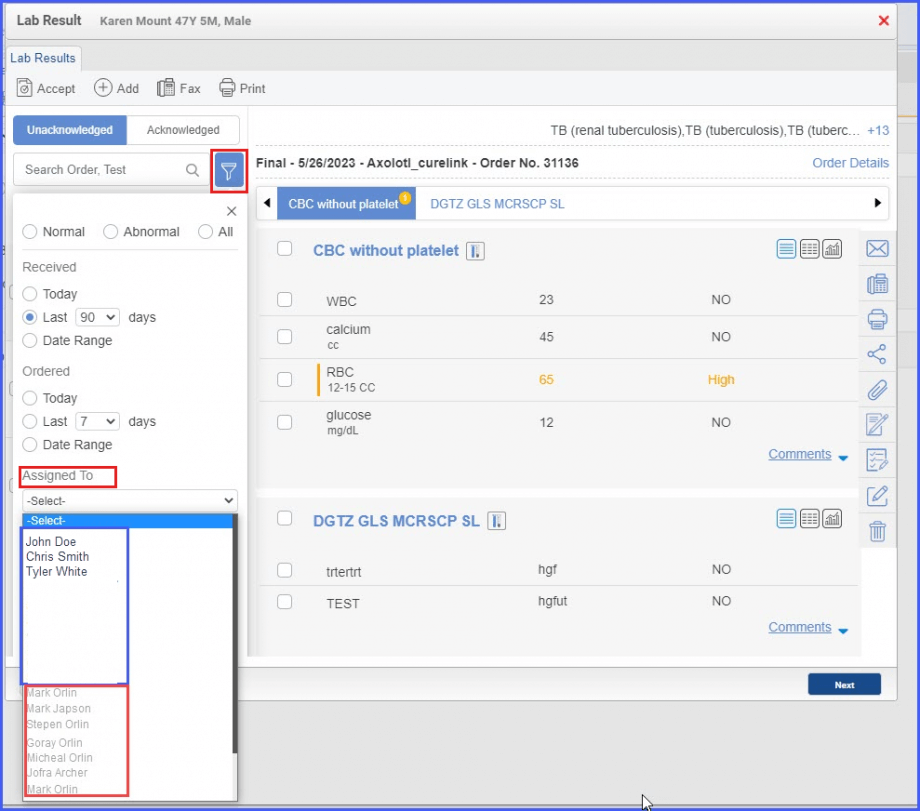
Similarly, in the “Ordering Provider” dropdown, when the user clicks on the filter icon in the lab results and clicks on the “Ordering Provider” dropdown, active ordering providers appear at the top of the list in black color. The inactive ordering providers, on the other hand, are displayed at the bottom of the list and are grayed out.

The user is able to send multiple lab results to patients via email or fax directly from the Labs Beta View.
To send multiple lab results via email, select the required results by enabling their respective checkboxes, then click on ‘Email’ button. The system displays the email window, where all selected results are displayed in the ‘Attached’ section.
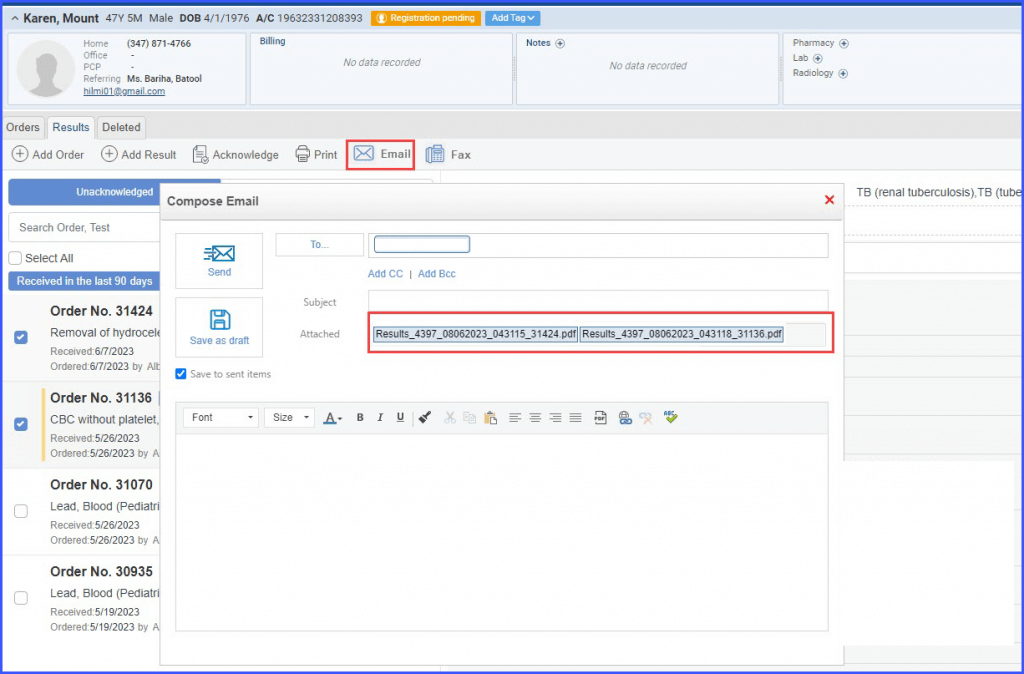
Similarly, the user can also send multiple lab results via fax. To do that, select the results from the listing section and click on ‘Fax’ button to access the ‘Compose Fax’ window. On this window, all selected results appear in the ‘Attached’ section.
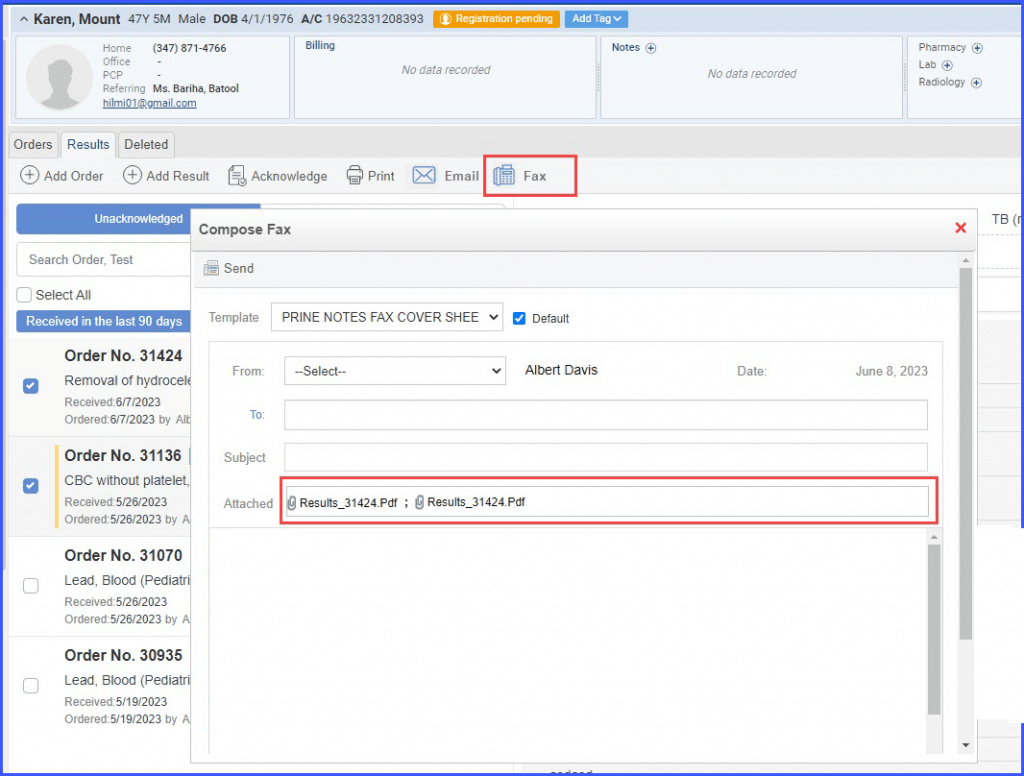
In instances where the email or fax button is clicked without selecting any results, the system displays a popup message prompting the user to select results. This helps prevent potential user errors and aids in maintaining smooth and efficient workflows.

The user opens the result flowsheet, an information icon is displayed next to the test name. When the user hovers over the information icon, a tooltip is displayed. The tooltip contains a table with crucial information related to the test by using LOINC as the standard. It offers a comprehensive overview that adds depth to the existing test information.
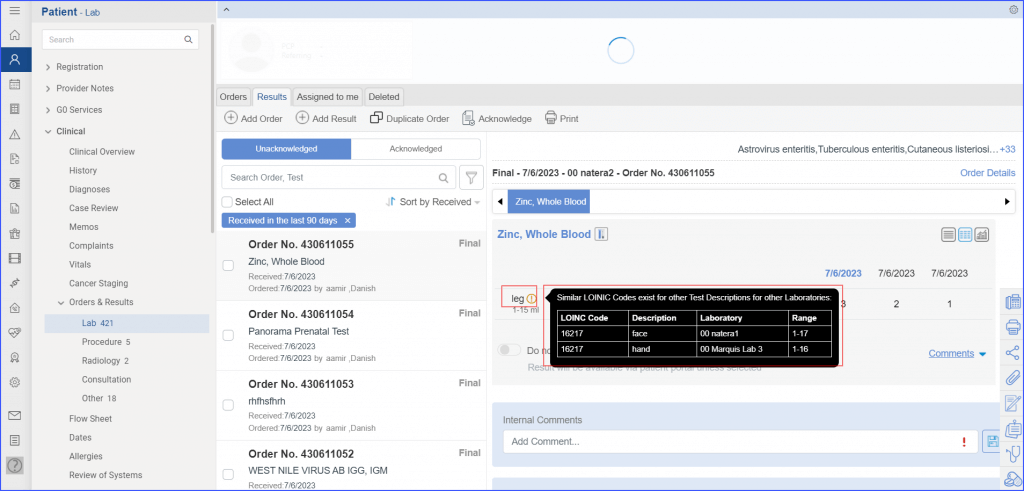
Users can view the test level comments received from the lab along with the results directly from lab results screen in Beta Lab view. This allows them to review the comments shared by the lab and provide the best appropriate care to the patients.
When the user opens a specific lab result that has comments associated with the tests, the system displays a ‘Notes’ icon next to ‘Specimen’ details icon.
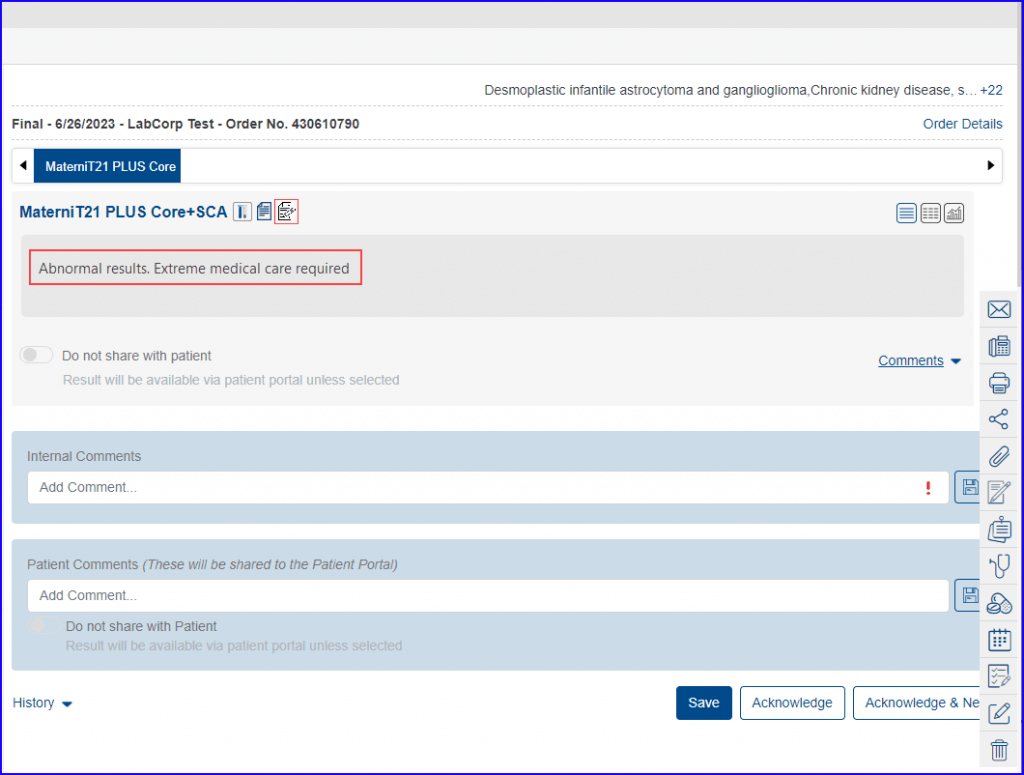
Clicking on the Notes icon displays the comments associated with the test under its name.
The system retains the last viewed page in the Lab Results Page. After the user has performed an action within the Lab Results Page such as deleting a result on Lab Results Page and then navigates back, the system remembers the page they user was on.
